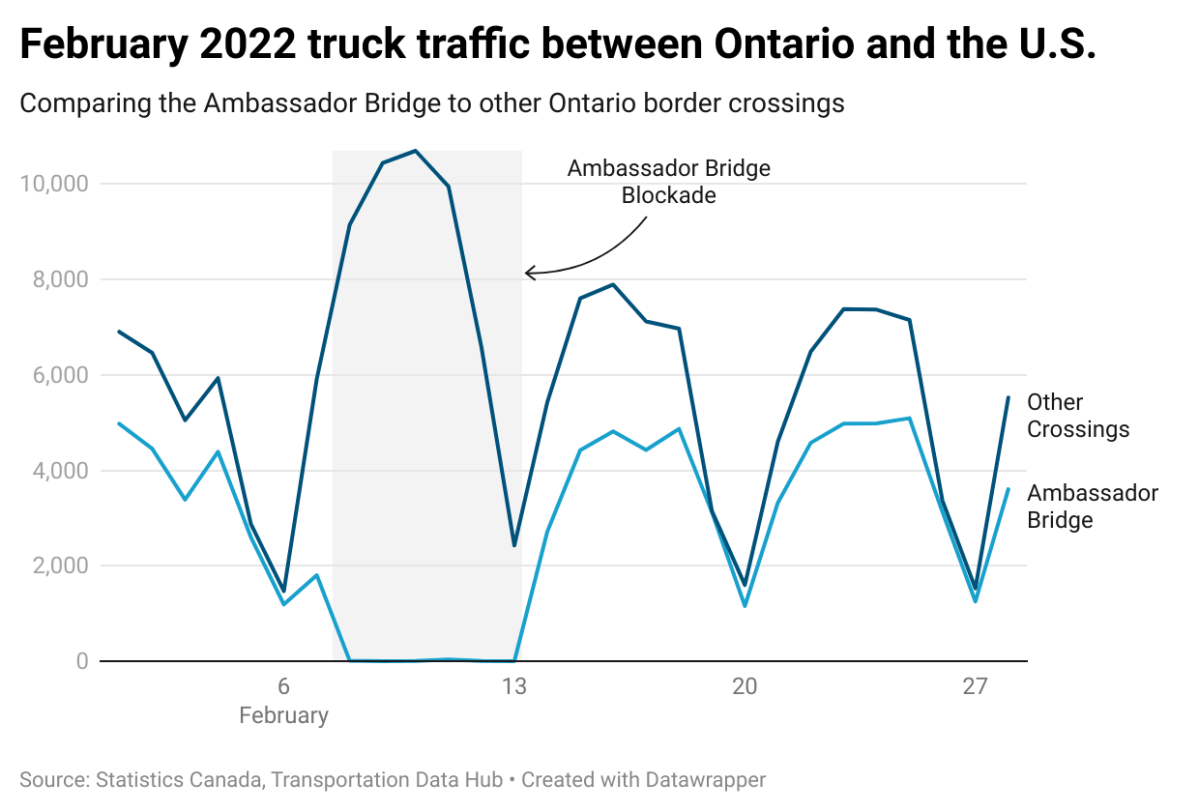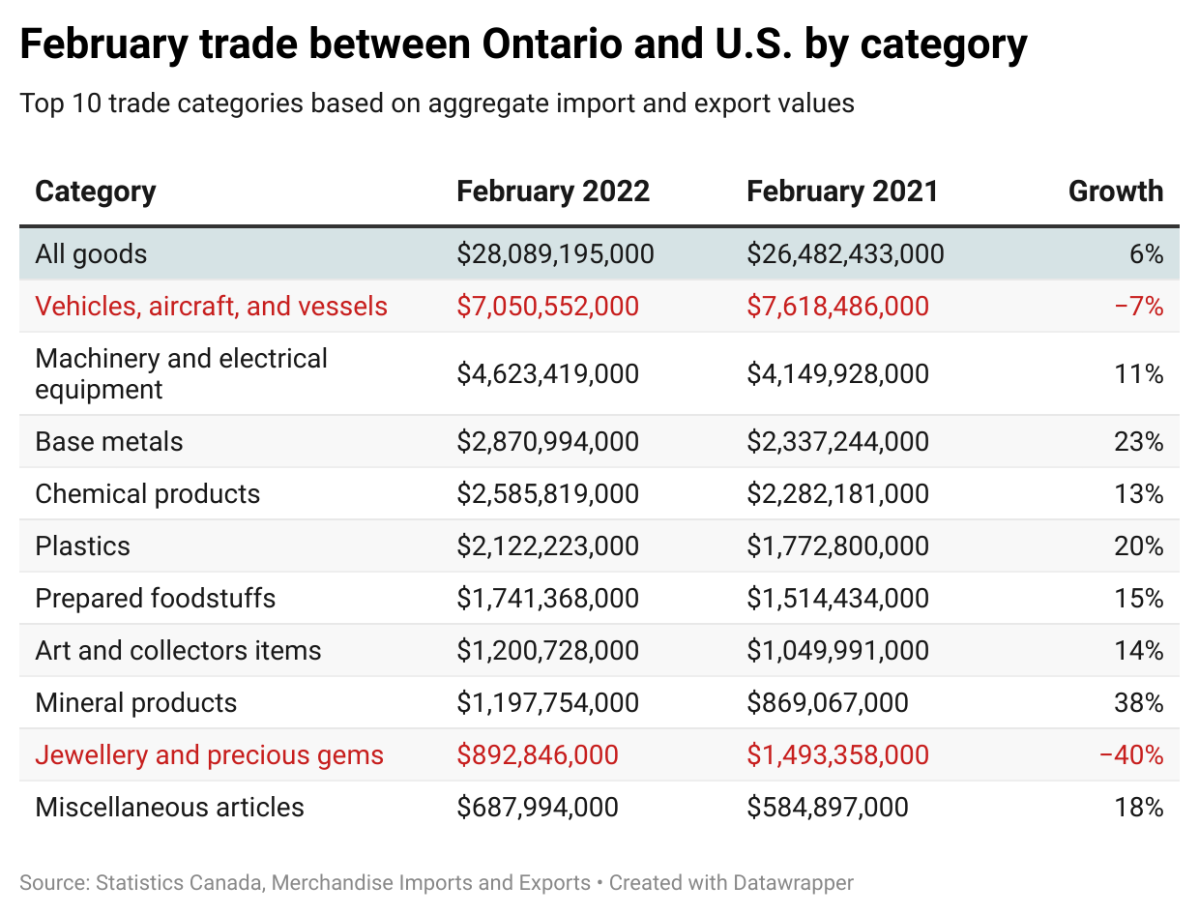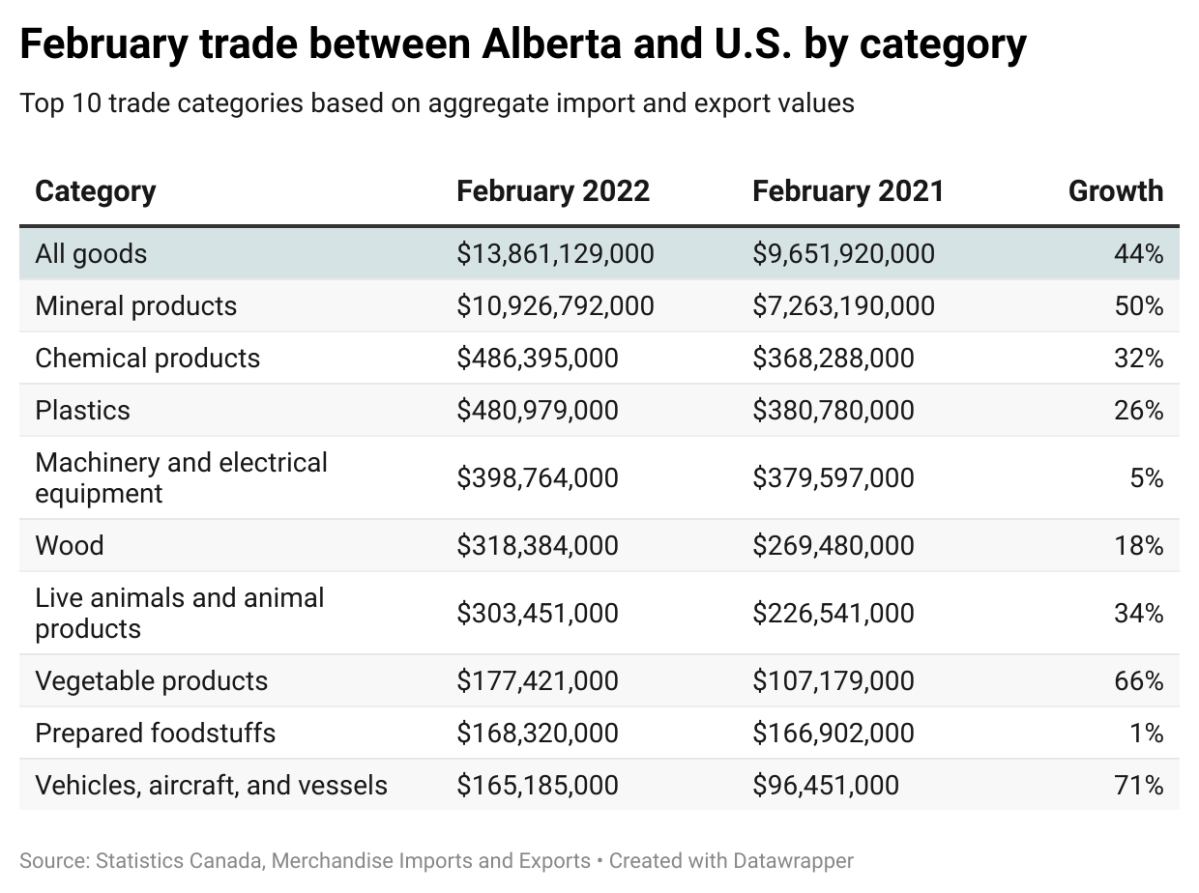Despite the highly publicized blockades at Ontario’s Ambassador Bridge and Coutts crossing in Alberta, cross-border trade in Ontario and Alberta was up 16 per cent in February, compared to the same month last year, according to data from Statistics Canada.

And while some businesses were impacted by the blockades, the trade figures also raise questions about the government’s use of the Emergencies Act – a decision, in part, justified by “threats to (Canada’s) economic security” brought about by the blockades.
“I was surprised,” says University of Toronto economics professor Ambarish Chandra. “I would have expected it to have been worse.”
'We found other routes and we just kept going'
Demonstrators first blockaded the Coutts, Alta., border crossing on Jan. 29, bringing traffic at one of western Canada’s busiest crossings to a standstill. The initial effect on businesses was severe.
“The first couple days we basically came to a halt,” says Martin Jansen, general manager of the Fort Macleod-based seed processor Arjazon. The company had shipments stuck on both sides of the border.
But within a week, Canada Border Services began directing commercial traffic through the nearby Carway and Del Bonita crossings, and Jansen says his shipments made it through.
- More than half of small businesses say U.S. no longer reliable: CFIB data
- The Bank of Canada says these are the 3 warning signs for mortgage default
- Carney says Canadian military participation in Middle East war can’t be ruled out
- Canadians want floor-crossing MPs to face ‘immediate’ byelections: poll

Other businesses appear to have had the same idea. Road traffic along the Ambassador Bridge and Coutts crossings, as well as other embattled border crossings in B.C. and Manitoba, was down 8.8 per cent this February compared to the previous year, according to a report by Statistics Canada. But this decline was partially offset by an increase in traffic at nearby crossings.
Only 54 trucks made it over the Ambassador Bridge during the week-long blockade. But at the same time truck traffic along other Ontario border crossings shot up 72 per cent compared to the previous week, nearly making up for the loss.
Trade in perishable goods not impacted by delays
For Chandra, “the big concern was food trade.”
Perishable food is sensitive to shipping disruptions since even a short delay can result in unsalable products.
“If a truck full of fresh produce arrives three days later, the vegetables are probably not in great condition,” says Chandra.
Worst case scenario, you could end up with an entire truckload of tomatoes in the dumpster. But trade in perishable goods does not appear to have been hampered by the blockade.
U.S. vegetable trade was up seven per cent in Ontario, and 66 per cent in Alberta compared to the previous year, according to data from StatCan.

Get daily National news
Cross-border trade between Ontario, Alberta and the U.S. was up for all major types of goods in February, with the notable exception of Ontario’s largest commodity: vehicles and vehicle parts. That was down seven per cent over last year.
The tightly knit, cross-border supply chains made the auto industry especially vulnerable during the Ambassador Bridge blockade. Lacking timely deliveries, automakers as far south as Alabama scaled back production, resulting in cancelled shifts and lost wages for workers.
A February analysis by the Anderson Economic Group estimated the combined loss to auto industry workers and investors at $375 million.
Analyst Peter Nagle, of the automotive research firm S&P Global Mobility, notes that cross-border trade in completed vehicles was down this January and February compared to last year. However he believes this decline is largely a result of global supply chain issues that have bedeviled automakers.

“Supply chain shortages have limited overall production across the North American light vehicle industry,” says Nagle.
Government stands by Emergencies Act justification
Government officials stand by their decision to enact emergency powers.
“The illegal blockades in our capital and at our borders earlier this year had a significant impact on Canada’s economy,” says Alexander Cohen, a spokesperson for the Minister of Public Safety, in a statement, “which is why our government invoked the Emergencies Act to end them.”
Cohen cites a number of independent and widely publicized cost estimates to support this justification, including a Canadian Manufacturer and Exporters estimate that the Coutts blockade impacted $44-million worth of trade per day.
Deputy Prime Minister Chrystia Freeland made a similar case in February, stating that “the Ambassador Bridge has affected about $390-million in trade each day.”
According to the Ambassador Bridge website, roughly $400-million in goods are transported across the bridge daily during normal operation.

The closure of the bridge did not mean that businesses lost $400 million a day. Ontario’s stable international trade numbers and truck data suggest that most of these goods eventually made it to their destination, albeit through a more circuitous route.
“A lot of traffic was diverted to Sarnia and even the Peace Bridge between New York and Ontario,” says Chandra.
For Chandra, the dynamic response to the blockades makes it hard to put a simple dollar amount on the cost.
“The real question would be: who actually lost out from some transaction or trade that didn’t happen because of these bridges. And I’m sure that’s a big number,” says Chandra. “I’d just be surprised if anyone can really estimate that accurately.”
Local workers and businesses still took a hit
While the overall effect of the blockades on Canada’s economy appears smaller than originally feared, many did suffer as a result of these events.
“Definitely it impacted our business,” says Andres Curbelo, safety manager at HEMO logistics, a Windsor-based shipping company.
During the Ambassador Bridge blockade, all their cross-border traffic had to go through the Blue Water Bridge in Sarnia, adding up to six hours to every run. The increased fuel and labour costs proved challenging for the 60-person company.
“There were a lot of extra expenses that had to come out of pocket.”

Drivers with small children also found themselves struggling to plan their lives around chaotic, extended schedules.
Curbelo says that while business is back to normal, the sting felt by the blockade has taken time to wear off.
“You can’t make up those numbers from one day to the other.”
Blockades could deter international investment
Beyond the immediate costs of the blockades, Chandra also worries about the long-term effect the border disruptions may have on international business.
The Ontario auto industry, which directly employs more than 124,000 residents, depends heavily on its relationship with U.S. automakers.
“Does this send the message that businesses should be careful about assuming this unimpeded flow of goods across the border?”
On Feb. 9, a General Motors assembly plant in Lansing, Mich., cancelled two shifts because parts shipments were delayed following the Ambassador Bridge blockade.
Later that evening, Michigan Congresswoman Elissa Slotkin tweeted, “It doesn’t matter if it’s an adversary or an ally — we can’t be this reliant on parts coming from foreign countries.”
Cohen echoed Chandra’s concern, saying, “the blockades posed a serious risk to Canada’s reputation as a reliable place to invest.”
Assuming these blockades are a one-time event, Chandra thinks it’s unlikely to have a major impact on international investment.
“But you never know. There could have been decisions being made at that moment about building new plants or factories in Canada that might have been changed.”
The government announced Monday that Justice Paul S. Rouleau, an Ontario appeals court judge, would lead the public inquiry into the government’s use of the Emergencies Act.
— with a file from Global News’ Alex Boutillier











Comments
Want to discuss? Please read our Commenting Policy first.